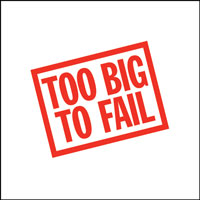 As with many folks in the financial and legal world, I’m finishing up Andrew Ross Sorkin’s entertaining new best-seller, Too Big to Fail: The Inside Story of How Wall Street and Washington Fought to Save the Financial System—and Themselves (Viking 2009). Clear Thinkers favorite Arnold Kling has the best analysis of the book that I’ve read to date:
As with many folks in the financial and legal world, I’m finishing up Andrew Ross Sorkin’s entertaining new best-seller, Too Big to Fail: The Inside Story of How Wall Street and Washington Fought to Save the Financial System—and Themselves (Viking 2009). Clear Thinkers favorite Arnold Kling has the best analysis of the book that I’ve read to date:
Reading the book leads me to ponder the differences between Chauffered America–Hollywood, investment bankers, and high government officials–and Strip Mall America–people who launch businesses like restaurants, hair salons, and other small enterprises. [. . .]
The obvious sociological point is that the top finance people live in a bubble, with secret entrances, isolated offices, chauffered automobiles, and private jets. Even the top government officials inhabit this world. Sorkin describes Geithner arriving at the airport in DC and losing it over not being met by a driver. Forced to take a taxi, Geithner turns to his colleague and says that he has no cash. Perhaps this would have been a moment to teach the head of the New York Fed how to use an ATM. [. . .]
I do not see how reading this book can help but reinforce a Simon Johnson/James Kwak view of Washington captured by Wall Street. Paulson seems to have no use for anyone who is not a Goldman Sachs alumnus. Geithner seems to have no use for anyone who is not a CEO of a large financial institution. Both of them view the collapse of major Wall Street firms as Armageddon.
The “regulatory overhaul” promised by the Obama Administration is still the same-old, same-old. Chauffered America will be restored to its exalted status, with a few new rules and regulations thrown in.
Instead, somebody should be asking the deeper question about Chauffered America. If Chauffered America were to disappear, would the rest of us miss it? Or could Strip Mall America get along just fine without the big-time bankers and their friends in government?
One comes away from the book with the conclusion that the primary purpose of the government and corporate leaders involved in resolving the crisis was to maintain the elitist culture of Wall Street with regard to financial matters, while at all times making sure that the government protected the maximum number of the folks making the bad bets from ever having to endure the true extent of the risk that they took in placing those bets. That’s why things like this happened.
As I noted after the demise of Lehman Brothers last fall, resolving the crisis was not rocket science. Sorkin’s book establishes that the leaders who were calling the shots were never going to let on that such was the case.

Far too many Americans have been conned into believing that Ivy League graduates like Timothy Geithner represent laissez faire capitalism. Nothing could be further from the truth. These individuals instinctively gravitate toward the big government doctrines of John Kenneth Galbraith and John Maynard Keynes. They rightfully sense that these left leaning economists provide rationalizations for their power grabs and financial manipulations—that greatly fatten their own investment portfolios. We must learn before itís too late to trust neither Democratic Party nor ìmoderateî Republican politicians. They must be marginalized.